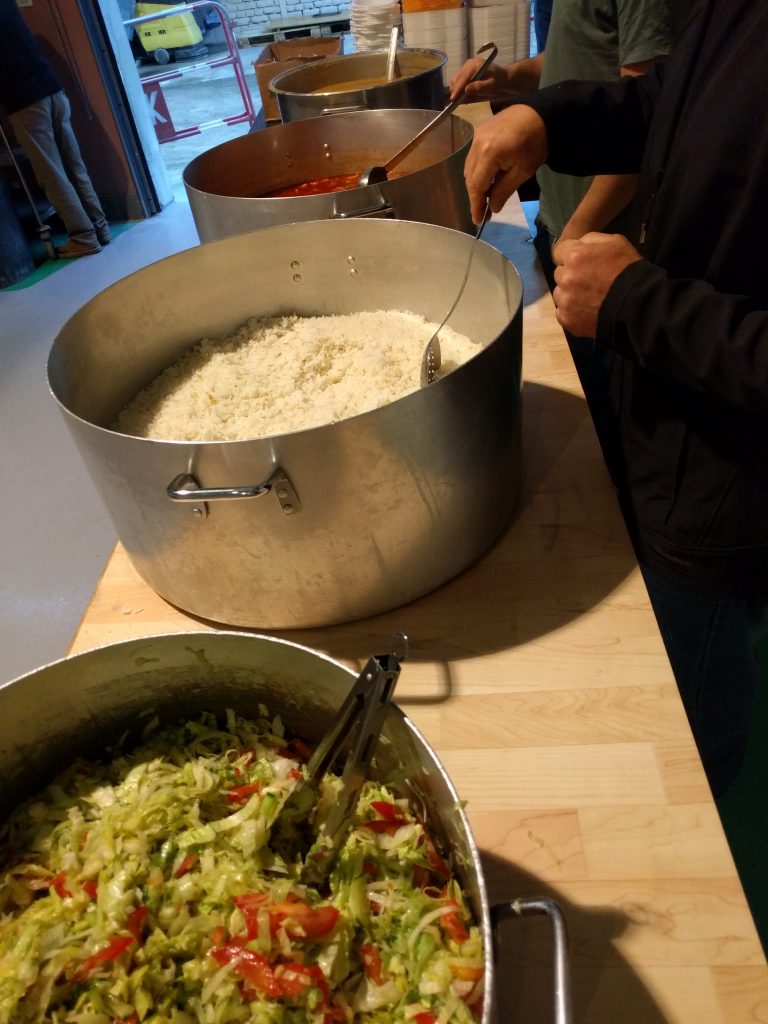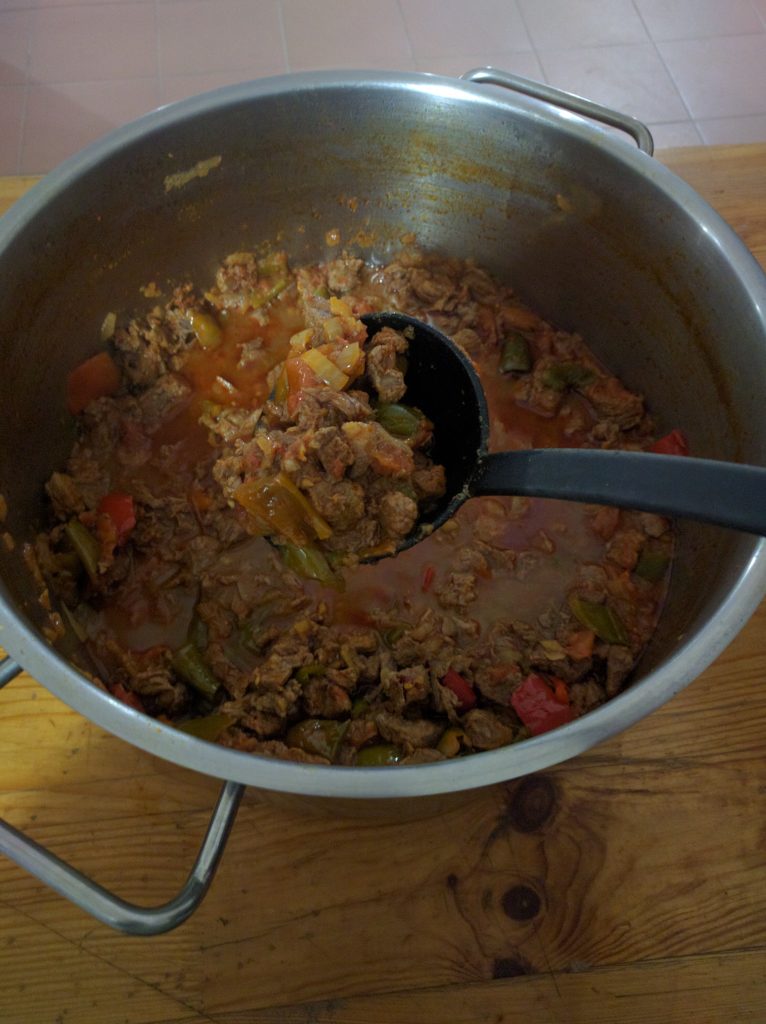Ramadan Diaries takes you into the Ramadan experience of two students of anthropology at Washington University in St. Louis, Oguz Alyanak and Dick Powis. They will be fasting amongst Muslims in two Francophone contexts, Strasbourg, France and Dakar, Senegal, respectively. By sharing brief notes on the fasting experience, the aim is to provide a reflexive account of participant observation as it is undertaken by two scholars with distinct backgrounds and field sites. This is the third entry in the series, you can read the Introduction here and Week One here.
Oguz Alyanak: On Ramadan Diet: A Vegetarian’s Perspective
Without a doubt, one of the challenges of doing fieldwork is dietary. While some may be open to dietary change, and willing to experience new dishes, others, like myself, may be less inclined in giving up on dietary restrictions.

For me, the dietary restriction has to do with keeping a vegetarian diet. The challenge in doing so is twofold. First is to remain a vegetarian while socializing with other Turks. While one could find delicious vegetable dishes in Turkish cuisine, vegetable-only dishes (usually prepared with olive oil) are more often associated with Western Turkey/the Aegean region. Most of my informants, on the other hand, come from Central and (South)Eastern Anatolia, and for them, meat has to be in most dishes. Most vegetable dishes and pastries therefore include pieces of chopped or minced meat, or are cooked using chicken/beef or bone broth. This does not mean that people do not make exceptions. Two years ago, during Ramadan, when I stayed in the highland villages of a Central Anatolian town (Kayseri)—which is famous for its dried meat/pastrami (pastırma) and meat dumplings (mantı)—and got invited to iftars, the housewives improvised (and some considered it a nice change from their everyday cooking routine), and used cheese or potatoes to fill those dumplings. Nonetheless, they still cooked another portion for themselves and their family using meat.

The second challenge is to retain my credibility as a member of the community. Eating becomes a performance through which others evaluate how much of a Turk I am, or to what extent I have retained my culture having lived overseas for many years. Being from Turkey but not eating meat is considered an incompatible combination by many of my informants. Often, questions about my decision to be a vegetarian precede jokes that question my masculinity (“What kind of a man are you? What kind of a man does not eat meat?”) and religiosity (“All other creatures are sent by Allah to mankind to serve us”). Some are curious about my decision and want to know why I do not eat meat. Despite my best attempts to explain myself—that it is not personal, but psychological, and I do not feel at ease about eating mass slaughtered and produced meat—others take it as a show of my lack of trust in them.
What makes Ramadan particularly problematic in this dietary context is that most iftars are communal. Relatives visit each other in their homes or book reservations in restaurants for group iftars, or donate money to the mosques to organize communal iftars for members of the congregation as well as the larger community. While it is easier to find vegetarian dishes in restaurant settings (in most Turkish restaurants in Strasbourg, vegetarian items are limited to salads, mezes/tapas, and cheese pastries), in house and mosque settings, the main course is always a stew (or beans/chickpeas with chopped beef or chicken). The nonmeat dishes consist of soup (lentil), salad (mixed greens), rice/bulghur and dessert.
These items have been central to my Ramadan diet too. Eating the same things every night not only gets boring, but also not very nutritious as my diet consists of basically no protein and lots of carbs. I used to make eggs and tofu for the sahur to compensate for the lost protein, but cooking at 3:30AM is not my favorite pastime. Moreover, eating heavy that late often results in troubles falling asleep. For a change, every now and then, in iftars, I take the main meat dish but eat only the vegetables and leave the meat aside. After 17 something hours of fasting, I do not question whether I am faithful to my vegetarian side when I eat vegetables (and rice) boiled in bone or beef broth.
Dick Powis: On Keeping Halal
The question of dietary restriction is probably the most pronounced illustration of just how differently Oguz and I think of ourselves in the world of Ramadan. While Oguz centers his short essay on the challenge that he faces as a vegetarian during Ramadan, I would also like to highlight that he makes a point to keep halal. That is, Oguz does not drink alcohol after iftar (and would not eat pork were he not a vegetarian). I, on the other hand, have actually broken my fast with a shot of Kentucky’s own Bulleit Bourbon.
I view the practice of fasting as separate from that of keeping halal. Fasting is not to give up one particular kind of food or beverage during the day, but all food and beverage, and it only lasts the month of Ramadan. Keeping halal is a lifetime commitment to avoid a whole suite of things – foods and behaviors with respect to foods and even some behaviors (e.g. smoking). Admittedly, fasting is but one component of Ramadan, which also includes communal prayer, a spiritual commitment to kindness, patience, endurance, and so forth, and sexual prescriptions. The Muslim men with whom I work do not give up alcohol and bacon during Ramadan, because it’s already halal – they already don’t consume those things. My goals in participating in Ramadan are to better understand fasting (not keeping halal) and to be polite to my peers who are fasting. These intersect when, as it often happens, a Catholic friend will call me during the day to invite me over for pork sandwiches and beer. (To his chagrin, I have never once given in. “Why fast?!” he asks. “We know you can! You already have!”)
This second point is actually more important. Again and again, I have been told in Dakar that should I ever want to break my fast early – as in, the middle of the day – that I could do so and no one would care. Unfortunately, I had the opportunity to test this on the first day of Ramadan this year when, after having drank a glass of tap water the night before, I found myself far too sick and dehydrated to keep fasting. Sure enough, when I did break the fast, no one said a word. For me, it’s the principle of politesse to continue, whether they care or not. Keeping halal, on the other hand, is a different thing. Whereas I may (however falsely) perceive that eating and drinking in front of my starving friends can be impolite or even cruel, I have no similar fears whatsoever about eating pork chops and drinking whiskey during or after ndogou. For my Muslim friends, those things are disgusting; they did not give them up for the same reasons we give up eating during the day – they never even consumed them in the first place. And as a testament to their ambivalence to my dietary preferences, they accompany me regularly to the largely Catholic restaurants that serve those things.
No one cares that I don’t keep halal. The only people that give me a hard time are, oddly, my professional colleagues.